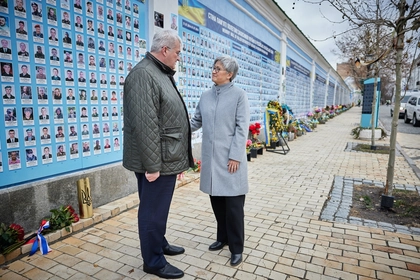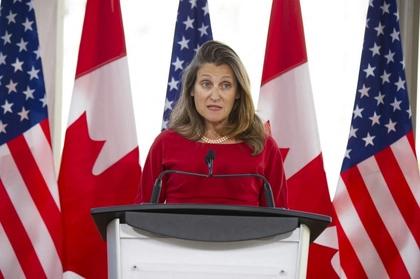With 24 days to go until the United States chooses a new president, the race looks as close as it could be. In a nation of 336 million people, the election once again looks set to be decided by a few thousand voters in a handful of places. In these final weeks of the seemingly interminable campaign, my focus groups with voters in seven crucial swing states will tell us what is on Americans’ minds as they decided who will replace Joe Biden in the White House.
Our tour begins in Phoenix, Arizona, where Biden won in 2020 but Trump now has a narrow lead, according to the latest polling. Two major factors help account for this. One is security on the border the state shares with Mexico – more than 8 million migrants have crossed illegally since Biden took office, around four times the number under Trump.
JOIN US ON TELEGRAM
Follow our coverage of the war on the @Kyivpost_official.
The other is that Hispanic voters, who make up around a third of Arizona’s population, are increasingly shifting from their traditionally solid support for Democrats. Largely working class, many of these voters warmed to Trump during his presidency and have been hit hardest by inflation in the post-Covid Biden years. And those who have migrated legally to the US often strongly support a firmer stance against those who simply walk across the border.
Some Hispanic voters, especially men, told us that having backed Biden four years ago or stayed at home, they were switching their support. “I would say circumstances have changed and it’s time for Trump again,” one man told us. Higher prices, a more dangerous world requiring stronger leadership at home, and the aim to cut energy costs by boosting domestic production – “drill baby, drill” as his mantra has it – all had their appeal. So did Trump’s plan to scrap tax on overtime pay, which he announced up the road in Tucson last month – “that really caught my attention,” a hard-pressed manual worker declared.

Australian Foreign Minister Visits Kyiv, Confirms Reopening of Embassy
One aspect of the campaign, which could cut both ways, is Americans’ familiarity with the former president. In the 2016 campaign, after each new Trumpian outrage, his opponents would think surely now people would see what kind of person he was (never grasping that they could see it all too clearly, but were going to vote for him because other things mattered more or because they liked the unfiltered, unvarnished nature of what he was saying).
Elements of this mindset still exist. A new book from Bob Woodward, the veteran Washington reporter who uncovered the Watergate scandal that brought down Nixon, claims that Trump has spoken to Vladimir Putin some seven times since his election defeat, and even sent the Russian leader a private supply of Covid tests. The Trump campaign denies the allegation, to put it mildly: “None of these made-up stories by Bob Woodward are true and are the work of a truly demented and deranged man,” his spokesman said.
Does Harris signal a new progressive start or, as one voter put it to us, “a new face of the same old”?
But Trump’s backers like the idea that he can talk to world leaders – friendly or otherwise – and use his relationships to America’s advantage. “Eventually, unless you’re planning on them all killing each other, you’re going to have to talk and figure out a way to stop the war,” said one. “He might be greasing the skids – ‘if I do get into office, is there something I can do here?’ Nobody wants to talk to Biden and Harris, there’s just no fear. Trump likes to keep other world leaders guessing.”
After the assassination attempt against Trump in July, many on both sides thought the election was all but settled in his favor. (Some Democrats in our groups even told us they wondered if it had all been “engineered.” “My first thought was, is this even real? Some people were saying it was like a little blood pack,” said one. “Something felt fishy. I still don’t know what to believe,” added another. Don’t let anyone tell you that conspiracy theories are the exclusive preserve of the MAGA crowd.)
But the advent of Kamala Harris has transformed the race. There is huge relief that the choice is no longer between two octogenarian white men, and that trying to stop Trump no longer means voting for someone clearly incapable of governing.
Having had a fairly low profile as vice president, Harris has had only a few weeks to introduce herself to the country as the Democrat nominee, and many feel they still don’t know her very well. Some find this concerning. Touting a record as a tough prosecutor in California, she developed a reputation as a liberal in the Senate and now positions herself as a moderate. Some wonder which is the real Kamala. Does she signal a new progressive start or, as one voter put it to us, “a new face of the same old”? There is also frustration at what they see as a lack of policy detail. “When I hear her talk, it just makes me think ‘why am I not hearing anything’?” complained one exasperated voter.
Yet paradoxically, the challenge for Harris in the remaining weeks is not to define herself, but to avoid doing so. Republicans are doing their best to paint her as a woke lefty. (“Kamala’s for they/them. President Trump is for you,” declares a TV attack ad, citing her past support for taxpayer-funded sex change operations for prisoners.) Events, or a rare unguarded moment in the final weeks of a carefully curated campaign, may yet reveal more than she intends.
But if she can keep it up until election day, this strategic ambiguity means that moderates who thought Biden was just too old and don’t want a return to the Trump circus can cling to the hope that she represents experience and continuity; younger voters fed up with what they see as the compromises of the Biden years can project onto her their hope for something more radical.
“I don’t know what to expect from her,” one participant put it. “I’m only voting for her because Trump is the alternative.” If it works and she wins, whichever side is to be disappointed won’t find out until she’s in the White House. But if she loses, both will be devastated.
This piece first appeared in the Daily Mail and is reprinted with the author's permission. See the original here.
Lord Ashcroft KCMG PC is an international businessman, philanthropist, author and pollster. For more information on his work, visit lordashcroft.com. Follow him on X/Facebook @LordAshcroft.
The views expressed in this opinion article are the author’s and not necessarily those of Kyiv Post.
You can also highlight the text and press Ctrl + Enter






